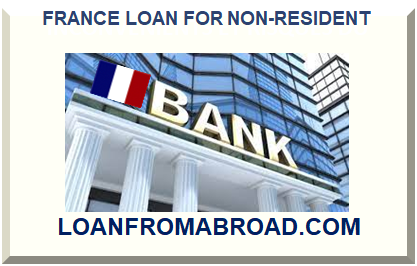
FRANCE LOAN AND MORTGAGE FOR FOREIGNER NON-RESIDENT 2024
FRANCE PERSONAL PERSONAL LOAN AND HOME LOAN FOR NON-FRENCH WITHOUT RESIDENCY
In France, a personal loan (prêt personnel) for a foreigner non-resident in 2024 who is not a resident is defined by an unsecured lending provided by French banks or financial institutions and can be used for various purposes such as financing personal projects, purchasing a vehicle, or covering unexpected expenses.
In France, the mortgage (crédit immobilier) for a foreigner non-resident is a loan specifically for purchasing property as a way to invest in the French real estate market, however, non-residents might face higher down payments, additional fees, and possibly higher interest rates, reflecting the perceived increased risk by French lenders.
In France, personal loan and mortgage for non-French citizen from French lenders can be a viable option, but it requires careful consideration as challenges include navigating a foreign banking system, potential language barriers, and dealing with complex regulatory and tax implications added to fluctuations in exchange rates that can significantly impact loan repayments if the borrower's primary income is in another currency.
In France, personal loans and mortgages for non-residents in 2024 serve specific purposes, as personal loans offer flexibility for diverse personal needs, while mortgages enable investment in the French property market, with some French lenders may require a French bank account history or credit interactions within the EU
Which financial institutions in France propose a loan and mortgage for foreigner non-resident in the country
Several financial institutions in France provide loan and mortgage options for non-resident foreigners looking to purchase property:
- BNP-Paribas - Offers a variety of financing options, including mortgages for non-residents.
- Société Générale - Provides comprehensive mortgage services to foreigners, with favorable terms for non-residents.
- Crédit Agricole - Known for accommodating international clients, providing tailored mortgages to non-residents.
- Banque Populaire - Features mortgage products specifically designed for foreign buyers, including non-residents.
- Caisse d’Epargne - Offers competitive mortgage rates for non-residents buying real estate in France.
- Crédit Industriel et Commercial (CIC) - Also provides mortgage options for non-resident foreigners.
- Crédit Mutual - Another option with services geared towards international clients seeking property in France.
OVERSEAS STUDENT LOAN CHRISTMAS LOAN LOAN BROKER OVERSEAS PRIVATE LOAN WITH GUARANTEE OVERSEAS MORTGAGE BUSINESS LOAN PERSONAL LOAN TAX ON LOANS WITHOUT COLLATERAL MICROFINANCE P2P LOAN CAR LOAN WITHOUT CREDIT CHECK CREDIT CARD DEBT CONSOLIDATION WITHOUT JOB WITH BAD CREDIT WITHOUT UPFRONT FEE FOR DISABLED ISLAMIC LOAN LIST OF BROKER LEASING FROM ABROAD LOAN FROM OVERSEAS BANK CHINA THAILAND EUROPE FOR MIGRANT FOR WOMEN CAR FOR FOREIGNER ELECTRIC BIKE LOAN STUDENT LOAN REPAYMENT FROM ABROAD LOAN FROM INDIAN OVERSEAS BANK FOR MASTER LOW INCOME LOAN OVERSEAS CROWDFUNDING FOR FARMER OVERSEAS PAYDAY LOAN WITH NEGATIVE RATE OVERSEAS BANK ACCOUNT OFFSHORE BANK ACCOUNT ANONYMOUS BANK ACCOUNT OFFSHORE BANK ACCOUNT ANONYMOUS BANK ACCOUNT GERMANY LOAN SWISS BANK ACCOUNT LUXEMBOURG ACCOUNT PANAMA ACCOUNT DUBAI BANK ACCOUNT LOAN FOR US CITIZEN LOAN FOR BRITISH SWITZERLAND LOAN MORTGAGE FOR ALIEN LOAN FOR HOUSEWIFE FOR FOREIGNER UK LOAN LIST OF GERMAN BANKS KREDIT OHNE SCHUFA USA LOAN AUSTRALIA LOAN FRANCE LOAN BELGIUM LOAN NO PROOF OF INCOME WITHOUT INTEREST START-UP LOAN MAURITIUS MOROCCO NEW ZEALAND LIST OF SWISS BANKS LUXEMBOURG LOAN LIST OF UK CAR LEASING MONACO LOAN SAUDI ARABIA QATAR LOAN FROM GOVERNMENT ANDORRA LOAN FOREIGN INSURANCE FOREIGN CAR INSURANCE FOREIGN HEALTH CARE FOR EXPATRIATE FOR CROSS-BORDER FOR NRI BLACKLISTED LOAN MOTORBIKE LEASING LICHTENSTEIN LIST OF INTERNATIONAL BANKS CANADA LOAN WITHOUT SCHUFA ISRAEL LOAN ITALY MORTGAGE DUBAI LOAN LOAN FOR REFUGEE LEASING FOR FOREIGNER SPAIN PORTUGAL LEASING GERMANY BKR LOAN